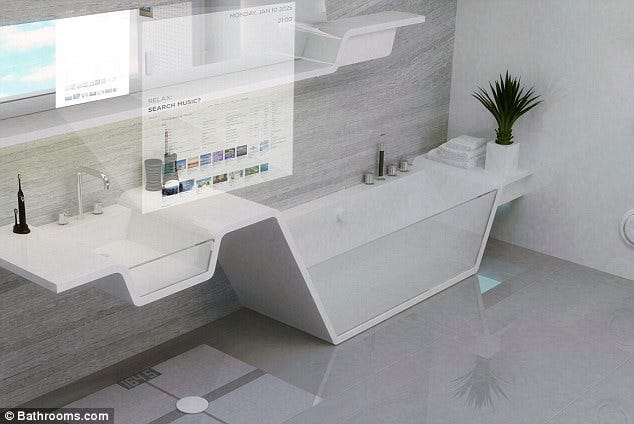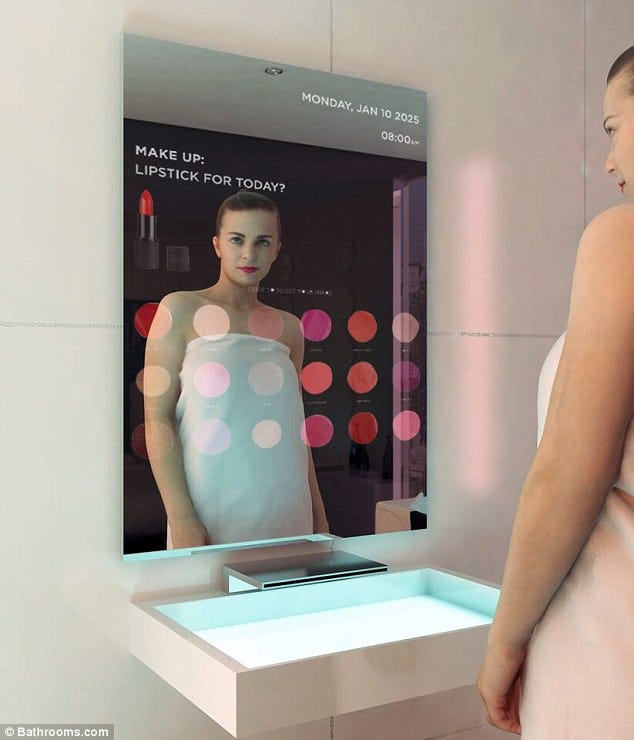How did those 2015 predictions for 2025 work out?
10 years ago I was amused by two predictions for the future, one about bathrooms and the other about technology.
Yogi Berra famously said, “It's tough to make predictions, especially about the future.” Ten years ago, when I was writing for Treehugger, I reviewed two predictions for 2025, one by British futurist Ian Pearson discussing bathrooms and the other by “data-driven optimist” Peter Diamandis about technology. They both might agree with Yogi.
Futurist Ian Pearson made some predictions in 2015 that were published in the Daily Mail and illustrated for Bathrooms.com, which I have had a lot of fun with.
'By 2025, bathrooms will be rich in internet-of-things connectivity.” Our mirrors are supposed to be “capable of performing health checks as well as advising people on their hair and style. They will have millimetre-thin organic LED displays, be fully connected to the internet, and have high-resolution cameras embedded inside. Smart mirrors could also be used for video check-ups with doctors and could even perform retina scans that could indicate illnesses.”
“Smart mirrors could also change the way people get ready and apply make-up. And as augmented reality becomes more popular, Dr Pearon believes people will use their bathroom mirror to coordinate their virtual appearances using avatars, as well as to act as a magic mirror to try out new make-up products, hairstyles, jewellery and even clothing.”
I am amused by the same old 2015 toothbrush sitting out on the counter while the toilet lid is up, and the separate hot and cold water controls. Though this is from the UK, so I should be thankful that there are not separate hot and cold spouts. As is usually the case with bathrooms of the future, they are just bathrooms of the present with smart mirrors and electronics added.
Another set of predictions that made me giggle in 2015 came from Peter Diamandis, self-described as “the founder and executive chairman of the XPRIZE Foundation, which leads the world in designing and operating large-scale incentive competitions. He is also the executive founder of Singularity University” Some of his predictions:
“In 2025, $1000 should buy you a computer able to calculate at 10^16 cycles per second (10,000 trillion cycles per second), the equivalent processing speed of the human brain.”
-the fastest home computer chip, the just-introduced M4, does 4.48 billion cycles per second.
He has us all wired up with a trillion sensors.
“We’re heading towards a world of perfect knowledge. With a trillion sensors gathering data everywhere (autonomous vehicles, satellite systems, drones, wearables, cameras), you’ll be able to know anything you want, anytime, anywhere, and query that data for answers and insights.”
Oh, and we will love all this AI stuff that will be coming down the pipe; he was a lot closer to the mark here.
“Artificial intelligence research will make strides in the next decade. If you think Siri is useful now, the next decade’s generation of Siri will be much more like JARVIS from Iron Man, with expanded capabilities to understand and answer. In a decade, it will be normal for you to give your AI assistant access to listen to all of your conversations, read your emails and scan your biometric data because the upside and convenience will be so immense.”
In the light of recent events and discussions about the state of health care in the US, his predictions for health and medicine are almost wishful thinking:
“Thousands of startups, as well as today’s data giants (Google, Apple, Microsoft, SAP, IBM, etc.) will all enter this lucrative $3.8 trillion healthcare industry with new business models that dematerialize, demonetize and democratize today’s bureaucratic and inefficient system. Biometric sensing (wearables) and Artificial Intelligence will make each of us the CEOs of our own health. Large-scale genomic sequencing and machine learning will allow us to understand the root cause of cancer, heart disease and neurodegenerative disease and what to do about it. Robotic surgeons can carry out an autonomous surgical procedure perfectly (every time) for pennies on the dollar. Each of us will be able to regrow a heart, liver, lung or kidney when we need it, instead of waiting for the donor to die.”
And, of course, the blockchain!
“If you haven’t heard of the blockchain technology, I highly recommend you read up on it. You might have heard of bitcoin, which is the decentralized (global), democratized, highly secure cryptocurrency based on the blockchain. But the real innovation is the blockchain itself, a protocol that allows for secure, direct (without a middleman), digital transfers of value and assets (think money, contracts, stocks, IP).”
Diamandis calls himself an optimist, but some might find his vision of trillions of sensors a bit dystopic. But his predictions are not far off, perhaps just a few years early. It is likely AI is already reading our mail and listening to our conversations, and my Apple watch is already scanning my biometric data. He was certainly wrong about medical advances; the system is as bureaucratic and inefficient as ever. Nobody is talking about blockchains, and Bitcoin will follow NFTs and blow up any day now.
And nowhere does he mention what is powering all these computers and sensors and blockchains. The fundamental problem with his vision is the upfront emissions from making all this stuff and the fossil fuels that will be burned to keep them working. He predicts that “We will grow from three to eight billion connected humans, adding five billion new consumers into the global economy.” It will be interesting to see if we can keep the lights on.






Do futurists address energy? Do they say we will use mostly solar and wind powered electric devices, from phones, to cars, to mining equipment? Do they recognize the existence and energy cost of data centers? It seems the more electronic and data driven we make our world, the less the natural world survives. Until our futurists start imagining a natural world recovery can we afford to follow their imaginary lead? I will stick to my manual toothbrush, or better yet use a branch of a toothbrush tree (Salvadora persica) that regenerates itself.
You really wouldn't want a bathroom mirror, of all things, connected to the internet.
As the writer of this article
https://www.theguardian.com/commentisfree/2024/dec/18/is-your-air-fryer-spying-on-you-its-time-to-stop-buying-unnecessary-smart-devices
observed
'if you bring an internet-connected object into your home in the year 2024 then you should fully expect it to be listening to you. And you should also be prepared for someone to hack it'.